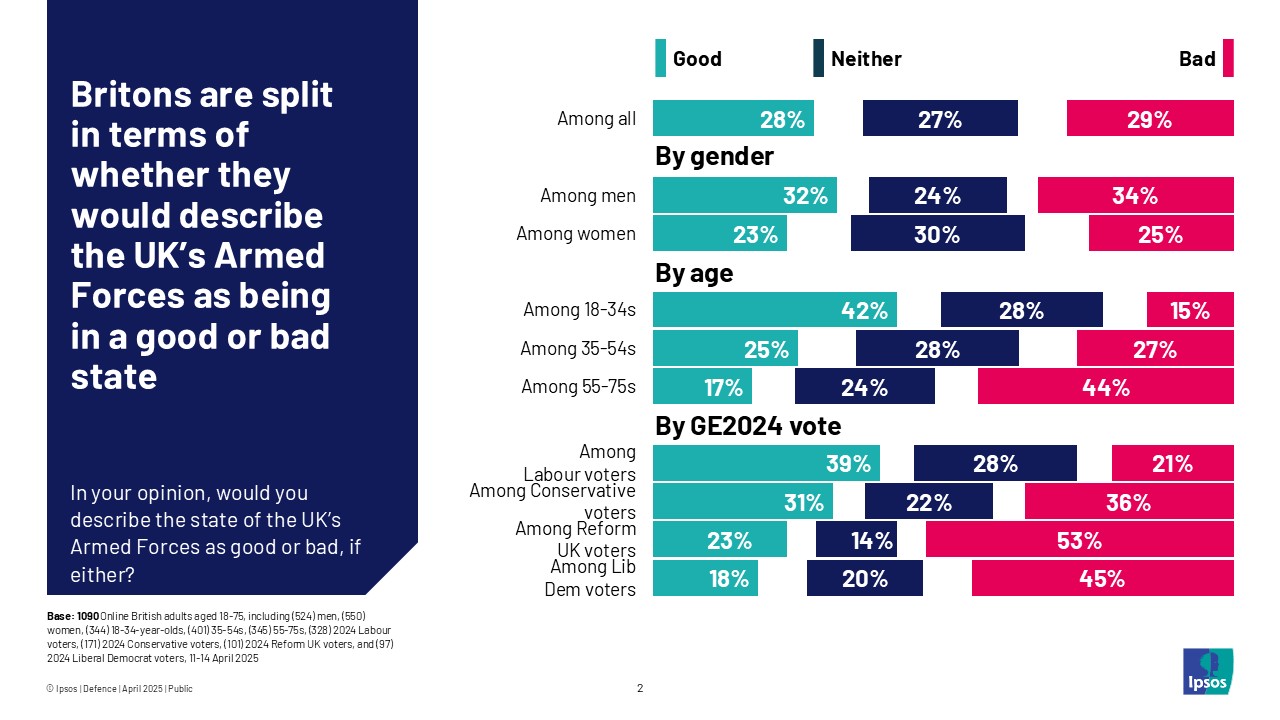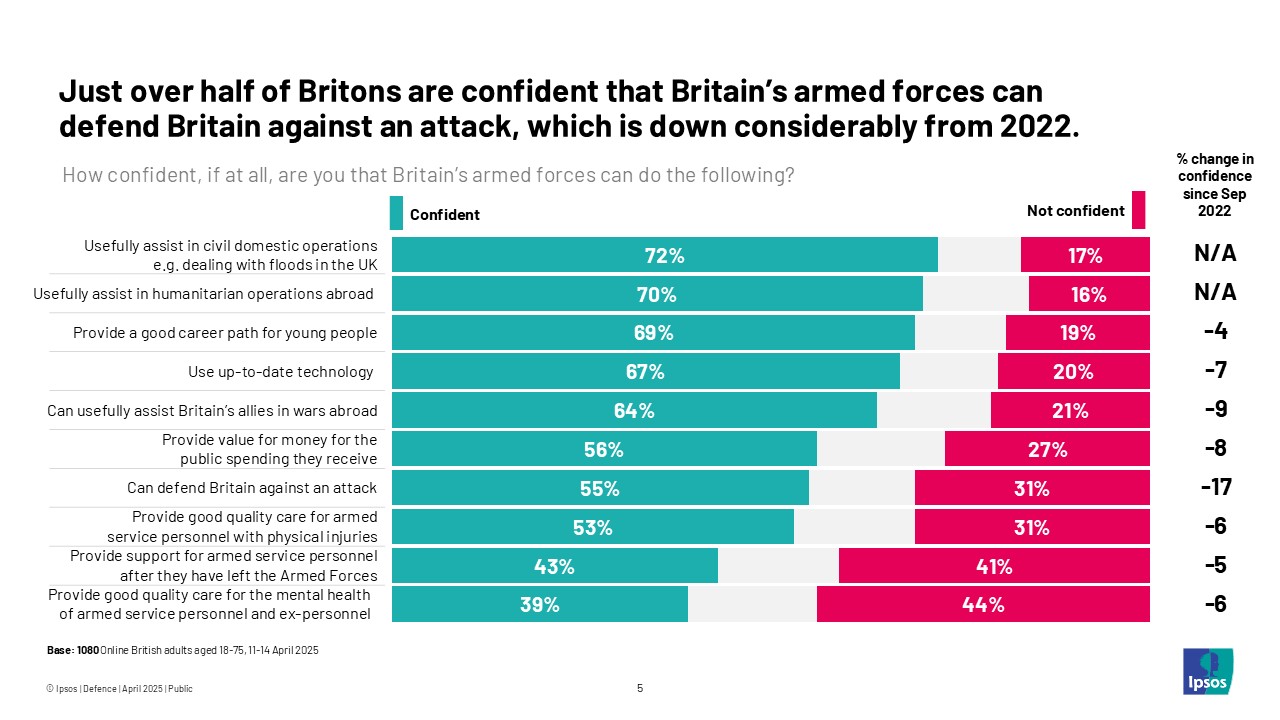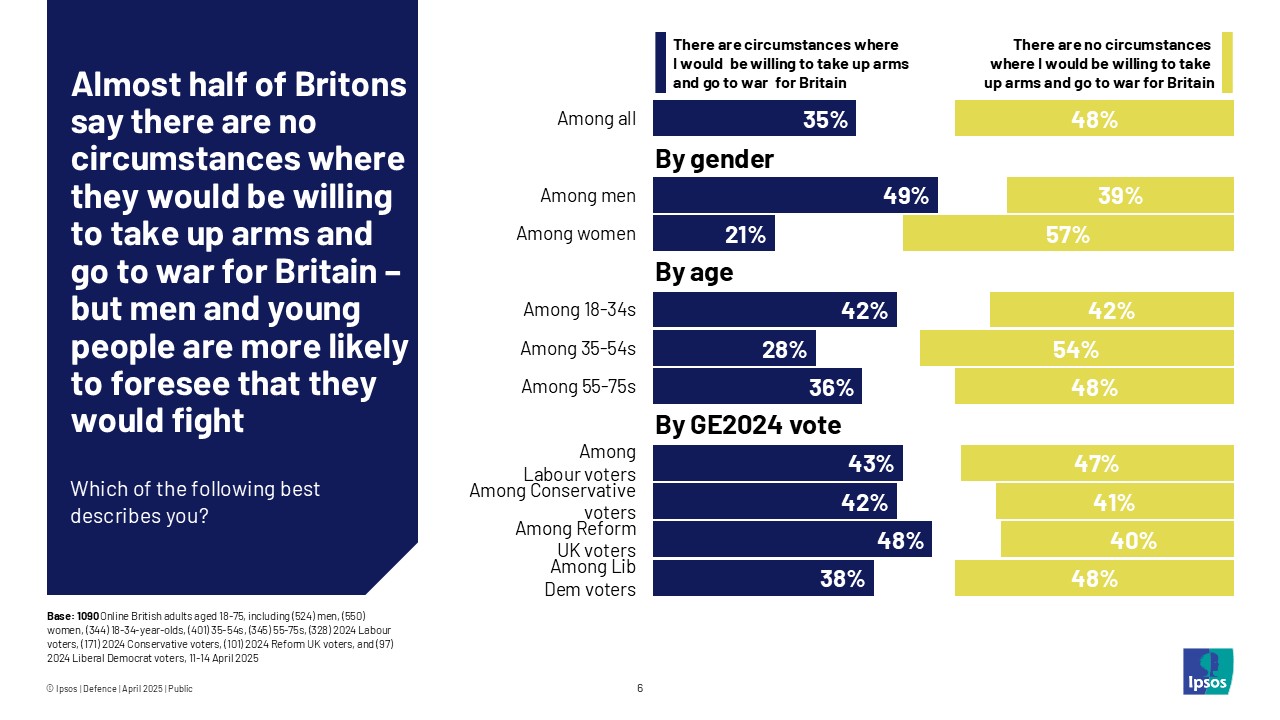A third of Britons – higher among men and young people - would take up arms for country, as confidence in armed forces to defend Britain from attack falls since 2022
A new Ipsos in the UK poll conducted between the 11th and 14th April 2025 reveals British public opinion on the state of the UK's Armed Forces and defence spending priorities ahead of the Strategic Defence Review. The online survey of 1,090 British adults aged 18-75 provides insights into public confidence in the military, preferred defence relationships, and willingness to serve.
Key findings
- Split views on the state of the armed forces: British adults are divided on the condition of the UK's armed forces, with 28% feeling they are in a good state, 29% as bad, and 27% as neither. Confidence is highest among those aged 18-34 (42%) and those who voted Labour at the last general election (39%).

- Declining confidence in defence capabilities: While a majority (55%) remain confident in the armed forces' ability to defend Britain against an attack, this figure has dropped 17ppts from 70% in September 2022. Confidence in other areas, such as their ability to assist allies and providing value for money, has also seen declines. Overall, there is most confidence in Britain’s armed forces to assist with civil domestic operations such as floods (72%) and humanitarian operations abroad (70%), and least in their ability to provide support for service personnel after they have left the Forces (43%) or to provide quality care for the mental health of current and ex-personnel (39%).

- 4 in 10 continue to support for increased defence spending: Just over four in ten (43%) believe government spending on defence should be increased, even with potential tax increases or reduced spending in other areas. This sentiment has remained relatively stable since February this year, following the contentious meeting between Donald Trump and Volodymyr Zelenskyy in the Oval Office.
- Reluctance to serve: Almost half (48%) of Britons say there are no circumstances where they would be willing to take up arms for Britain, a third (35%) say there are. However, 42% of those aged 18-34 say there are circumstances where they would be willing to take up arms (the younger age group are more likely to be of conscription age), compared with 28% of those aged 35-54 and 36% of those aged 55-75. There is an even bigger gender divide, with 49% of men saying they would be willing to serve compared with 21% of women.

- Prioritising intelligence, cybersecurity, and the Army: When asked how the UK’s defence budget should be spent, Britons highlight intelligence and surveillance (37%), cybersecurity (36%), and increasing the size of the army (28%) as the top three areas to prioritise.
- EU and NATO favoured as key defence partners: The EU (41%) is Britons’ priority to build a close defence relationship with, followed by NATO (39%) and the USA (35%).
- Europe preferred over America: Elsewhere in the poll, Britons were asked about their attitudes towards America versus Europe. A majority of Britons express a preference for Europe and Europeans over America and Americans across various measures, including liking people (80% Europeans vs 55% Americans), opportunities to learn from others (62% Europe vs 32% America), and where they would live if they could not live in Britain (64% Europe vs 28% America).
Commenting on the findings, Gideon Skinner, Senior Director of UK Politics at Ipsos said:
Our latest polling underscores the public’s anxiety about the current state of Britain’s armed forces and its ability to meet the threats that the country faces – showing that the military aren’t immune from the levels of public concern that we see facing other public services. For instance, since 2022 there has been a significant drop in the proportion of the British public who have confidence in the armed forces' ability to defend the country against an attack. Britons also want to investment to help respond to modern challenges, such as intelligence gathering and cybersecurity. Of interest, almost half of Britons say there are no circumstances where they would be willing to take up arms for their country, which may also reflect concerns over the armed forces’ ability to look after the wellbeing of their current and former service personnel. Nevertheless, 7 in 10 – including many young people themselves – still think the armed forces can provide a good career path for young people, and younger age groups – who are of course more likely to be conscripted – are more likely than some of their older counterparts to foresee circumstances in which they would be prepared to fight – although men are still most likely to overall.
Technical note:
- Ipsos interviewed a representative sample of 1,090 online British adults aged 18-75. Polling was conducted between the 11th and 14th April 2025.
- Data are weighted to match the profile of the population. All polls are subject to a wide range of potential sources of error.




